
Compared with easily identifiable junk foods such as burgers and French fries, ultra-processed foods seem to be “better” in terms of disguise.
For young people, it is convenient and fast food; for children, it is delicious and addictive; for office workers, it has become the first choice for meal replacements.
But many people have overlooked that it is actually a potential carcinogen, and it may begin to damage the body since childhood.

Ultra-processed food intake increases cancer risk by 12%
According to the international food classification standard “NOVA” recognized by the Food and Agriculture Organization of the United Nations, food can be divided into 4 categories according to the degree of processing:
Unprocessed/minimally processed food
Non-alcoholic foods that are fresh, frozen, ground, pasteurized or isolated from the air and fermented, such as fruits, vegetables, milk, meat, beans, etc.
Cooking seasonings extracted from food
Common cooking and seasoning used for group 1 foods, such as salt, sugar, vegetable oil, soy sauce, vinegar and butter, etc.
Manufactured food
Fresh food is made with salt, sugar or other cooking ingredients, and does not change the food structure, such as canned vegetables, canned fish, cheese, etc.
Ultra-processed food
Food and beverages processed through a series of complex industries usually add food additives (such as colorants, flavors, emulsifiers, sweeteners, preservatives, stabilizers, thickeners, etc.) to increase the taste and look more attractive People, smell more delicious, easy to store, etc.
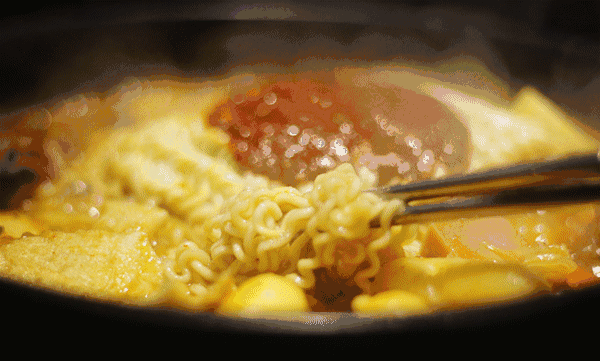
A study published in the British Medical Journal (BMJ) confirmed that a 10% increase in ultra-processed food intake may increase the overall cancer risk by 12% and the risk of breast cancer by 11%.
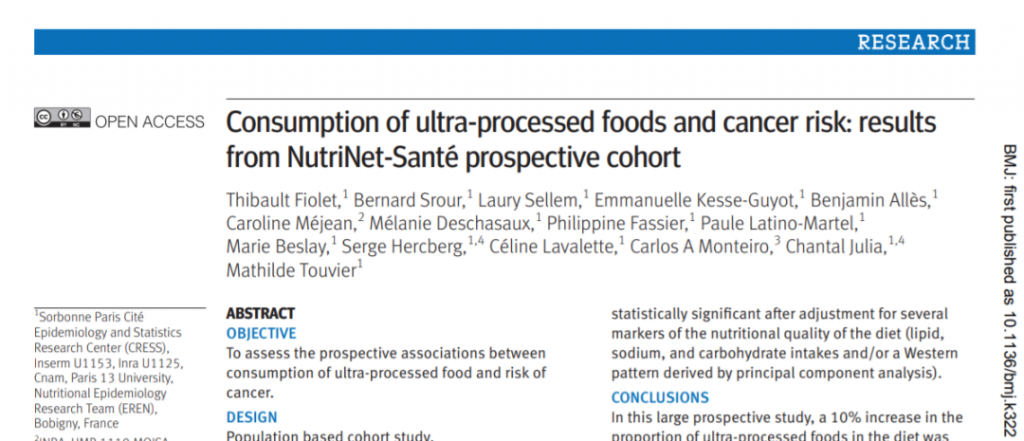
This study followed more than 100,000 French adults with an average age of 42.8±14.8 years in 2009-2017 for about 8 years. Investigate the 3300 kinds of food that the participants consume daily and score the food according to the NOVA food processing degree classification system.
After analyzing the results, it is found that young people, smokers, people with low education, who do not like exercise, and people without a family history of cancer will consume more super processed food.
Among all super processed foods, the foods that people consume the most, from high to low, are:
Sugary products-26%
Various beverages-20%
Starchy foods and breakfast cereals-16%
Deeply processed fruits and vegetables-15%
The results show that a 10% increase in the intake of super processed foods will increase the overall risk of cancer by 12%, increase the risk of breast cancer by 11%, and increase the risk of breast cancer in postmenopausal women by 13%.
For every 10% increase in the proportion of unprocessed food (NOVA Group 1 food) in the diet, the overall risk of cancer and breast cancer may be reduced.
Why are ultra-processed foods addictive?
The ham sausage or instant noodles that replace the dinner, the various sodas that are often drunk, the biscuits that are used to cushion the stomach during overtime… These ultra-processed foods usually have the following common characteristics that make people want to stop:
The taste is addictive
They tend to taste good and stimulate people’s taste buds by adding sweeteners, salt and flavoring agents similar to MSG.

Bright color
They are brightly colored, natural or synthetic pigments, color enhancers and preservatives, which make these foods look delicious.
Great advertising
Their advertisements are everywhere, making everyone feel that these foods are delicious, convenient, and even healthy.
Convenient for long-term storage
They are not fresh ingredients, because preservatives and preservatives are added to allow these foods to be stored for a long time on the shelf or in the dining cabinet.
low-cost
They are low-cost, cheap, do not require cold chain transportation, have a variety of packaging, and often have various purchases and gifts.
From a health point of view, you should try to eat these ultra-processed foods as little as possible. If you want to eat them, try to choose “low sugar, low salt, and low fat” types, but don’t buy a lot because of this, let alone use them as a substitute for natural foods.
7 major injuries, which will accumulate since childhood
Recently, researchers from Imperial College London, Sao Paulo University in Brazil, and Harvard University in the United States published a study in the Journal of the American Medical Association Pediatrics, claiming that the consumption of ultra-processed foods is particularly harmful to children’s health, and the intake of more ultra-processed foods Food for children, all unhealthy indicators have increased.
Ultra-processed food seems to be a “match” for young people who save trouble, eat well and live alone. However, excessive intake and high frequency may bring 7 kinds of burdens to the body, and they begin to accumulate from childhood:
More likely to be obese
A study in Cell Metabolism in 2019 found that with the same amount of major nutrients, sugars, sodium and fiber, the ultra-processed food group consumed significantly more calories per day and gained weight within 2 weeks Up 0.9 kg.
This shows that even with the same nutritional intake, people who eat ultra-processed food are more likely to get fat.
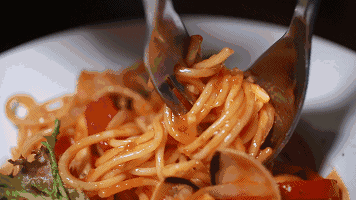
Lack of nutrition
Vitamins, minerals, and dietary fiber are lost in ultra-processed foods. Frequent consumption of these products can easily lead to insufficient or lack of micronutrient intake.
Affect development
Recently, a new study published by the Hebrew University of Israel in the journal Bone Research found that rodents that eat ultra-processed foods grow stunted and their bone strength is adversely affected.
The researchers said that the study explains that ultra-processed foods have serious damage to the bone growth of developing children.

Easy to be depressed
A French study involving 30,000 participants found that for every 10% increase in the proportion of ultra-processed food in the diet, the risk of depression increased by 21%.
Increased respiratory disease
A study involving nearly 110,000 teenagers in Brazil found that teenagers’ consumption of ultra-processed foods is positively correlated with asthma risk. Those with the highest consumption of ultra-processed foods had a 27% increase in asthma risk.
High risk of cardiovascular disease
The study found that people who eat too much ultra-processed foods have a 25% increase in overall cardiovascular disease risk compared to people who eat too much ultra-processed foods.
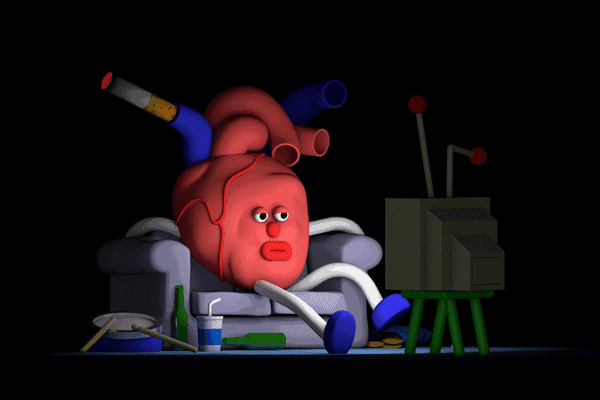
Increased metabolic disease
People who eat more ultra-processed foods have an increased risk of metabolic system diseases. This association is stronger among young people and decreases with age.
In addition, the high salt, high oil, and high sugar in ultra-processed foods can easily cause inflammation and increase the risk of cancer.
4 tips to quit ultra-processed foods
Ultra-processed food has become an important part of people’s daily diet. According to a European data, ultra-processed food has accounted for 50% to 90% of the intake of various nutrients.
If it may be unrealistic for people to quit this type of food immediately, it is recommended to avoid staying away from it as much as possible by using the following methods:
Make a good match for your daily diet
It is best not to eat ultra-processed foods, especially processed meat products, candies, puffed foods, and fried foods.
Make a good mix of daily diet, change the habit of relying too much on “bright, white, and refined” foods, and focus on fresh fruits and vegetables, whole grain foods and high-fiber foods.
Cook at home
Try to cook at home as much as possible, and don’t bother to eat it alone. The American Cancer Society recommends that when cooking food at home, you should add as little oil, sugar and salt as possible, and try to replace high-fat or high-sodium artificial flavorings with vinegar, lemon juice, garlic and natural flavors.
Change snack choices
Choose sanitary and nutritious foods for snacks, such as fruits, milk, soybeans and their products, nuts, whole wheat bread, boiled sweet potatoes, etc.
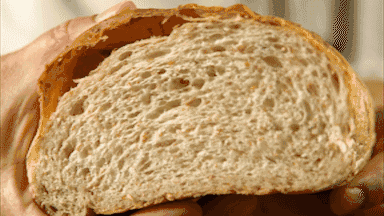
Learn to recognize ultra-processed foods
The ingredient list meets any of the following characteristics and may be ultra-processed food:
Products containing more than 5 ingredients may be super-processed;
Is there a series of things you don’t know;
Whether it contains sugar, fructose syrup, refined vegetable oil and other ingredients;
Whether it contains sodium benzoate, nitrate, sulfite, BHA, BHT and other preservatives.
Some foods containing preservatives, such as sausages (containing salt and nitrate), are also considered super processed.
Comments